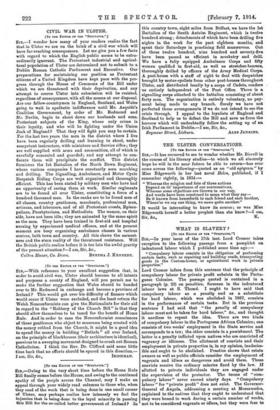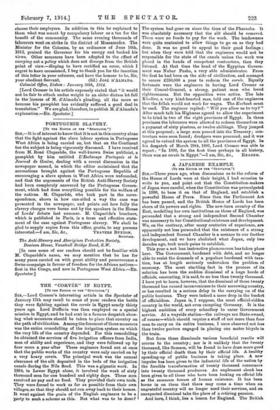WHAT IS SLIVERY ?
[To :as Fames or ran ••Srscraroa."1 Sia,—In your issue of the 17th inst. Lord Cromer takes exception to the following passage from a pamphlet on indentured labour which I published some time ago :— " Compulsory labour consists in the obligation of performing certain tasks, such as repairing and building roads, transporting goods in the Custom-horse, or agricultural work in private properties."
Lord Cromer infers from this sentence that the principle of compulsory labour for private profit subsists in the Portu- guese Colonies. The passage quoted is contained in a paragraph (p. 23) on penalties, foreseen in the indentured labour laws at S. Thome. I ought to have said that compulsory labour as a penalty and as a substitute for hard labour, which was abolished in 1867, consists in the performance of certain tasks. But in the previous sentence I bad said that " the penally of compulsory labour must not be taken for hard labour," dee., and thought it needless to repeat the idea. There are two kinds of compulsory labour in the Portuguese African Colonies ; one consists of two weeks' employment in the State service and corresponds to a tax; the other consists in a punishment. The latter is a penalty inflicted upon natives who are convicted of vagrancy .or idleness. The allotment of convicts and their employment in private properties is, in my opinion, inadmiss- ible and ought to be abolished. Practice shows that estate owners as well as public officials consider the employment of vagrants and idlers as dangerous and avoid them. These convicts receive the ordinary salaries fixed by the law. If allotted to private individuals they are engaged under the supervision of the protector. The terms of "com- pulsory labour" never exceed ninety days. "Compulsory labour" for "private profit" does not exist. The Governor- General of Angola, addressing a meeting at Mosaamedes, explained to the natives that they ought to understand that they were bound to work during a certain number of weeks, not to be considered vagrants or idlers, but they were free to choose their employers. In addition to this he explained to them what was meant by compulsory labour as a tax for the benefit of the community. The same evening thousands of labourers went on strike in the district of Mossamedcs. The Minister for the Colonies, by an ordinance of June 16th, 1913, praised the Governor for his energy and backed his views. Other measures have been adopted to the effect of carrying out a policy which does not diverge from the British point of view.—Hoping to have rectified an error, which I regret to have occasioned, I beg to thank you for the insertion of this letter in your columns, and have the honour to be, Sir,
[Lord Cromer in his article expressly stated that "it would not he fair to attach undue weight to an obiter dictum let fall in the ;course of M. d'Almada's pleading, all the more so because his pamphlet has evidently suffered a good deal in translation." We are glad, therefore, to publish M. d'Almada's explanation.—En. Spectator.]











































 Previous page
Previous page